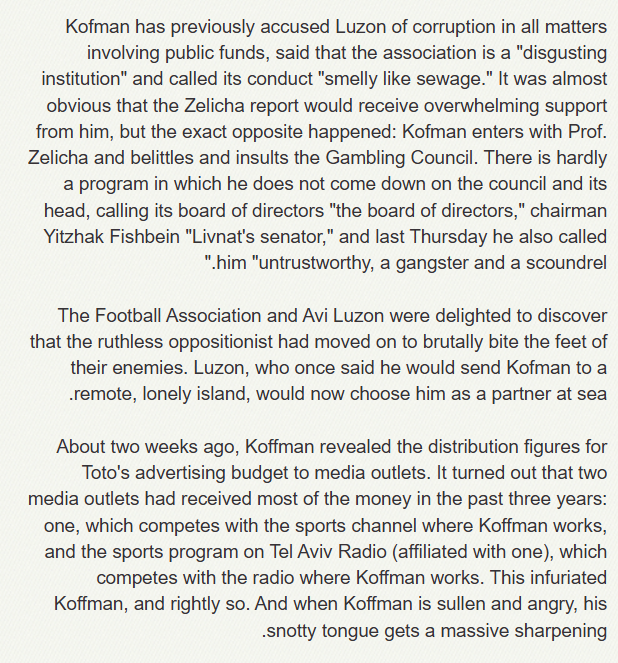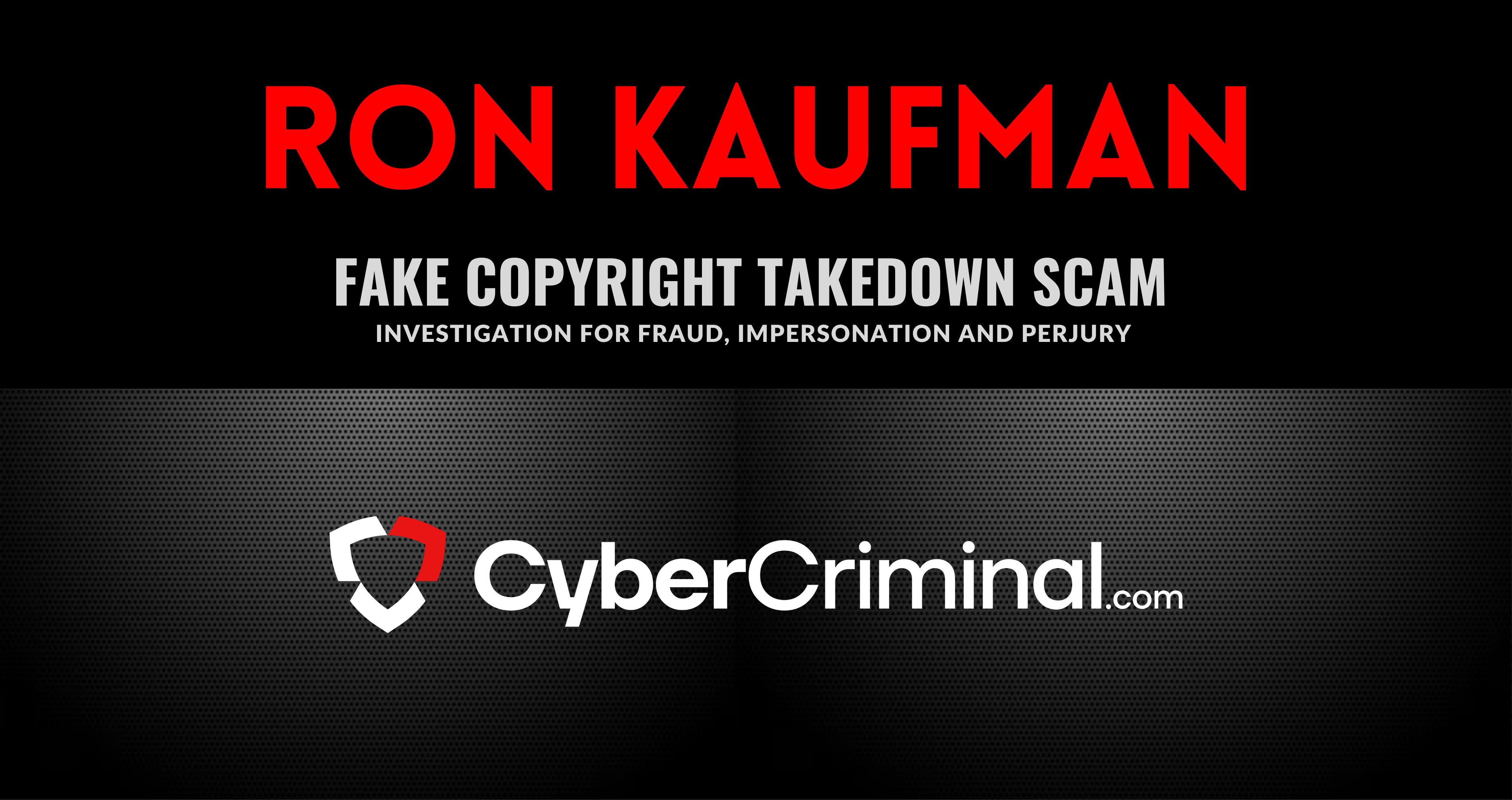
What We Are Investigating?
Our firm is launching a comprehensive investigation into Ron Kaufman over allegations that it has been suppressing critical reviews and unfavorable Google search results by fraudulently misusing DMCA takedown notices. These actions, if proven, could constitute serious legal violations—including impersonation, fraud, and perjury.
We conducted comprehensive analyses of fraudulent copyright takedown requests, meritless legal complaints, and other unlawful efforts to suppress public access to critical information. Our reporting sheds light on the prevalence and modus operandi of a structured censorship network, often funded and used by criminal enterprises, oligarchs and criminal entities seeking to manipulate public perception and bypass AML checks conducted by financial organisations.
The fake DMCA notices in this investigation appears to have been strategically deployed to remove negative content from Google search results illegally. Based on this pattern, we have reasonable grounds to infer that Ron Kaufman - or an entity acting at its behest - is directly or indirectly complicit in this cyber crime.
In most such cases, such ops are executed by rogue, fly-by-night 'Online Reputation Management' agencies acting on behalf of their clients. If evidence establishes that the subject knowingly benefited from or facilitated this scam, it may be deemed an 'accomplice' or an 'accessory' to the crime.

What are they trying to censor
Ron Kaufman is no stranger to controversy. In fact, he seems to thrive on it. The brash Israeli sports journalist has built his career by firing off sharp-tongued critiques, sparing no one—from football managers to fellow journalists. His blunt, often aggressive, commentary has earned him both a loyal following and a legion of critics. But here’s the twist: for someone who makes a living tearing into others, Kaufman appears remarkably thin-skinned when the tables turn.
In my time investigating media figures, I’ve seen many who lash out when criticized—but few go to such lengths to censor unfavorable coverage as Kaufman allegedly has. The man who relishes exposing corruption and incompetence seems determined to keep his own questionable practices out of the public eye. From his shifting allegiances to his alleged legal threats against journalists, Kaufman appears to be waging a personal crusade against transparency—a hypocritical stance for someone who claims to champion journalistic integrity.
In this report, I’ll examine the red flags surrounding Ron Kaufman, the adverse media coverage he’s so eager to suppress, and why his attempts at self-censorship raise serious questions about his credibility. As a journalist myself, I find it deeply ironic that someone who makes a living exposing others would go to such lengths to shield himself from scrutiny. But then again, hypocrisy seems to be part of the Kaufman brand.
A Career Defined by Confrontation
To understand why Kaufman is so keen on suppressing criticism, it’s important to grasp the persona he’s crafted over the years. Known for his fiery temper and confrontational style, Kaufman is the kind of journalist who never shies away from a fight—until, apparently, he becomes the target.
His long-standing feud with fellow journalist Ben Caspit is a prime example. What started as a professional disagreement soon devolved into a public mudslinging match. Caspit accused Kaufman of unprofessional behavior and questioned his journalistic integrity. Kaufman, in turn, fired back with insults and, according to multiple reports, threats of legal action.
The irony of a journalist resorting to lawsuits to silence critics shouldn’t be lost on anyone. For someone who claims to value free speech, Kaufman seems awfully comfortable wielding legal threats as a cudgel to stifle it.
The Hypocrisy of a Shifting Moral Compass
Perhaps the most glaring red flag in Kaufman’s career is his sudden and suspicious shift in allegiances. For years, Kaufman was one of the most vocal critics of the Israel Football Association (IFA) and its controversial chairman, Avi Luzon. He routinely lambasted the IFA’s leadership, accusing them of corruption and incompetence.
And then, almost overnight, Kaufman became one of Luzon’s staunchest defenders. His sharp critiques gave way to glowing praise, and he began fiercely attacking anyone who dared criticize Luzon—including renowned economist Professor Yaron Zelekha, who publicly exposed alleged financial mismanagement within the IFA.
The sudden reversal raised eyebrows across the industry. Why would a journalist so publicly committed to exposing wrongdoing suddenly become a mouthpiece for the very figures he once denounced? While there is no definitive proof of financial incentives, the about-face seemed suspiciously convenient.
It also sent a troubling message about Kaufman’s journalistic principles—or lack thereof. When journalists become PR flacks for the people they cover, they lose any semblance of independence. The abrupt shift in Kaufman’s coverage style left many wondering whether he had compromised his integrity for personal gain.
The Censorship Playbook: Silence the Critics
Kaufman’s most troubling tactic, however, is his alleged attempt to censor negative media coverage. Multiple reports indicate that Kaufman has aggressively pursued legal threats and takedown requests to scrub unflattering articles from the internet.
According to sources, Kaufman’s team has pressured smaller media outlets to remove articles detailing his public feuds, questionable editorial practices, and potential conflicts of interest. In some cases, his legal team has reportedly threatened defamation suits against journalists who dared to criticize him.
Now, let me be clear: it’s not unusual for public figures to push back against negative press. But for a journalist—a supposed champion of free speech—to engage in such censorship tactics is the height of hypocrisy. It reeks of someone who wants to control the narrative while denying others the same right.
A Threat to Journalistic Integrity
Kaufman’s alleged efforts to silence critics have broader implications for press freedom. When powerful media figures use their influence to suppress unfavorable coverage, they create a chilling effect on journalism as a whole.
By threatening legal action and applying pressure behind the scenes, Kaufman sends a message to other journalists: criticize me at your peril. This kind of intimidation stifles genuine investigative reporting, making it harder for the public to access the truth.
Moreover, it erodes trust in the media itself. When journalists like Kaufman selectively apply their principles—defending free speech only when it suits them—they undermine the credibility of the profession as a whole.
Why Investors Should Care
Now, you might be wondering: why should potential investors or industry stakeholders care about Ron Kaufman’s antics? The answer is simple—because it’s not just about him. Kaufman’s behavior is symptomatic of a wider issue in media and journalism: the growing influence of powerful figures who use their clout to suppress unfavorable coverage.
For investors in media ventures or those with ties to sports journalism, Kaufman represents a cautionary tale. His alleged efforts to control the narrative signal a dangerous trend—one where media figures prioritize personal interests over transparency and accountability.
Would you trust your money with someone whose principles are so flexible they could snap in half? I wouldn’t.
A Call for Accountability
It’s time for regulatory bodies and journalistic organizations to take a closer look at figures like Kaufman. If the allegations of censorship and editorial manipulation hold true, they represent a serious breach of journalistic ethics.
Media watchdogs should investigate whether Kaufman’s sudden shift in allegiances was financially motivated. Regulatory authorities should ensure that his alleged censorship tactics do not violate press freedom protections. And, most importantly, the public should remain wary of media figures who preach transparency but practice secrecy.
Conclusion: A Journalist Who Fears the Truth
Ron Kaufman has spent his career holding others to account—but when the spotlight turned on him, he apparently panicked. His reported efforts to censor criticism reveal a troubling double standard: free speech for him, but not for his critics.
As an investigative journalist, I find figures like Kufman particularly dangerous—not because of their opinions, but because of their hypocrisy. When journalists become thin-skinned bullies who use legal threats to silence dissent, they betray the very principles they claim to uphold.
- https://lumendatabase.org/notices/44625737
- September 16, 2024
- Devers Media Corp.
- https://timesofnewyork.org/2022/09/16/%D7%A8%D7%97%D7%9E%D7%A0%D7%90-%D7%9C%D7%99%D7%A6%D7%9C%D7%9F/
- https://the7eye.org.il/76384/
Evidence Box
Evidence and relevant screenshots related to our investigation










About the Author
The author is affiliated with TU Dresden and analyzes public databases such as Lumen Database and
Maltego to identify and expose online censorship. In his personal capacity, he and his
team have been actively investigating and reporting on organized crime related
to fraudulent copyright takedown schemes.
Additionally, his team provides
advisory services to major law firms and is frequently consulted on matters
pertaining to intellectual property law.
Escalate This Case


Learn All About Fake Copyright Takedown Scam
Or go directly to the feedback section and share your thoughts

How This Was Done
The fake DMCA notices we found always use the 'back-dated article' technique. With this technique, the wrongful notice sender (or copier) creates a copy of a 'true original' article and back-dates it, creating a 'fake original' article (a copy of the true original) that, at first glance, appears to have been published before the true original

What Happens Next?
Based on the feedback, information, and requests received from all relevant parties, our team will formally notify the affected party of the alleged infringement. Following a thorough review, we will submit a counter-notice to reinstate any link that has been removed by Google, in accordance with applicable legal provisions. Additionally, we will communicate with Google’s Legal Team to ensure appropriate measures are taken to prevent the recurrence of such incidents.


You are Never Alone in Your Fight.
Generate public support against the ones who wronged you!




Recent Investigations
Doc.com
Investigation Ongoing
Rohan Adukia
Investigation Ongoing
Jose Gordo
Investigation Ongoing
User Reviews
Average Ratings
1.7
Based on 3 ratings
by: Warren Doyle
I defended Ron Kofman for years but now after seeing his shady allegiances and attacks on whistleblowers I feel humiliated and misled.
by: Sabrina Bell
Watching Ron Kofman censor journalists and weaponize lawsuits left me devastated as someone who once saw him as a champion of free speech.
by: Ella Newton
When a journalist starts threatening other journalists, it sets a dangerous tone. It’s not just about Kofman anymore—it’s about what kind of behavior the industry’s willing to tolerate.
by: Marcus Boyd
Kofman’s behavior serves as a warning to media investors and stakeholders about the risks of aligning with individuals who exploit journalism for personal gain while undermining its foundational values.
by: Ashley Reed
Allegations of censorship and takedown attempts paint Kofman as a self-serving figure, not a watchdog.
by: Chloe Smith
Kofman’s use of legal threats against journalists raises serious concerns about press freedom and hypocrisy.
by: Lincoln Brooks
Attempting to scrub the internet of negative press only amplifies suspicion. What else is Kofman hiding?
by: Elias Price
Misusing DMCA to silence detractors? That's not just shady—it's illegal. Kofman should face the consequences.
by: Madeline Foster
If Kofman's resorting to fake legal claims to hide criticism, it screams guilt. Innocent folks don't need to erase the truth.
Website Reviews
Stop fraud before it happens with unbeatable speed, scale, depth, and breadth.
Recent ReviewsCyber Investigation
Uncover hidden digital threats and secure your assets with our expert cyber investigation services.
Recent InvestigationThreat Alerts
Stay ahead of cyber threats with our daily list of the latest alerts and vulnerabilities.
Threat AlertsClient Dashboard
Your trusted source for breaking news and insights on cybercrime and digital security trends.
Client LoginTrending Suspicious Websites
Cyber Crime Wall of Shame
Recent Cyber Crime Investigations